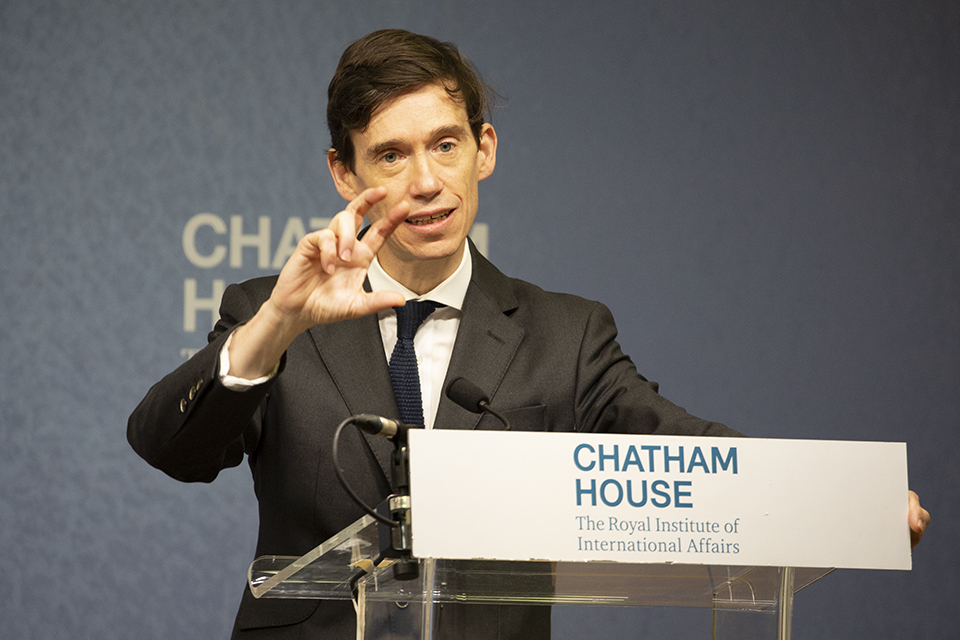Mine Clearance, Conservation and Economic Development in Angola
Secretary of State for International Development Rory Stewart speaking on demining at Halo Trust event in Chatham House.

Well the one thing I wasn’t going to cancel in my day is coming to join you. Because this is a project which gives me so much pride in what the international community is doing or governments like the Government of Angola are doing, what our great friends and partners the United States Government are doing.
And above all what wonderful British charities such as HALO and Mine Action and others are doing to deal with something which isn’t actually fundamentally something that we normally think of in terms of development, but something that is about humanity. It’s about our definition of what kind of world we want to live in. Of what we believe morally is or is not acceptable.
And for me, as for most people in the room, the question of mines is something that touches me like you personally, like many people in this room. I have seen what happens when somebody steps on a mine. I have worked very closely with people who survived stepping on a mine, in fact I employed people who survived stepping on a mine. My father I remember very clearly looking at the large chunk out of his leg from explosive ordnance as a child, and wondering at his huge gash in his thigh which remained even when he was in his seventies. By the time he was in his early nineties the wound had begun to go, but it was there 50 years after the impact.
And of course many people that I employed in Afghanistan were missing limbs from mines. I also feel this very strongly because I want to pay tribute to the people who work in this field. Many of the most talented people that I was lucky enough work with in my life have ended up working in Mine Action.
What shows me whatever we say about the statistics and I can stand here and talk about the amazing number of hectares that have been cleared and the percentage that have been cleared and all that means for economic development and livelihoods and agriculture indeed national partners and so much else. But the real thing that tells me it’s a good thing to do is the quality of the human beings that I know are dedicating their life to it.
That begins in my life with my friend General James Cowan who was my adjutant when I was a very young and incompetent 19-year-old officer in the Black Watch, but it goes on also to the extraordinary people who worked for me when I was running an NGO in Kabul in Afghanistan for three years that I lost three of my most talented employees to go off to work for HALO and they were some of the toughest bravest smartest people I knew and indeed one of them popped up in Angola.
So for me this has woven all the way through my earliest memories of the wound of my father’s thigh through myself shuffling around on a rainy parade ground as a young officer at the age of 19, through my whole life in Afghanistan and I think the thing that brings it together for me and the reason I’ve been so proud in a small way as originally a DFID minister to put my small part of the budget into supporting this was that I felt we had lost a trick in international development.
The point about international development isn’t simply about development with the capital ‘D’. In other words it is not just about the question of how you raise incomes, although that is very important for me, and we have a huge obligation for the poorest people in the world. But it isn’t just the what, it’s the how, what we feel is acceptable and what we don’t feel is acceptable. And these particular weapons are so brutal, so indiscriminate, so hidden, so non-lasting in their impact, represent something which should fill us all with a sense of ethical abhorrence.
And I’m very very proud about the work that we do in international development - we think not just about incomes, but about protection. And that might be protection of the climate. That might be protection of environment. That might be protection of human rights.
But above all today and the reason that I was so proud to partner with these wonderful organisations two and a half years ago to put more money from public international development in is because of this issue: The protection of people from a weapon that we should have never invented. A weapon that we should have never laid in the grounds and a weapon that I wish to work with all of you to eliminate from the world.